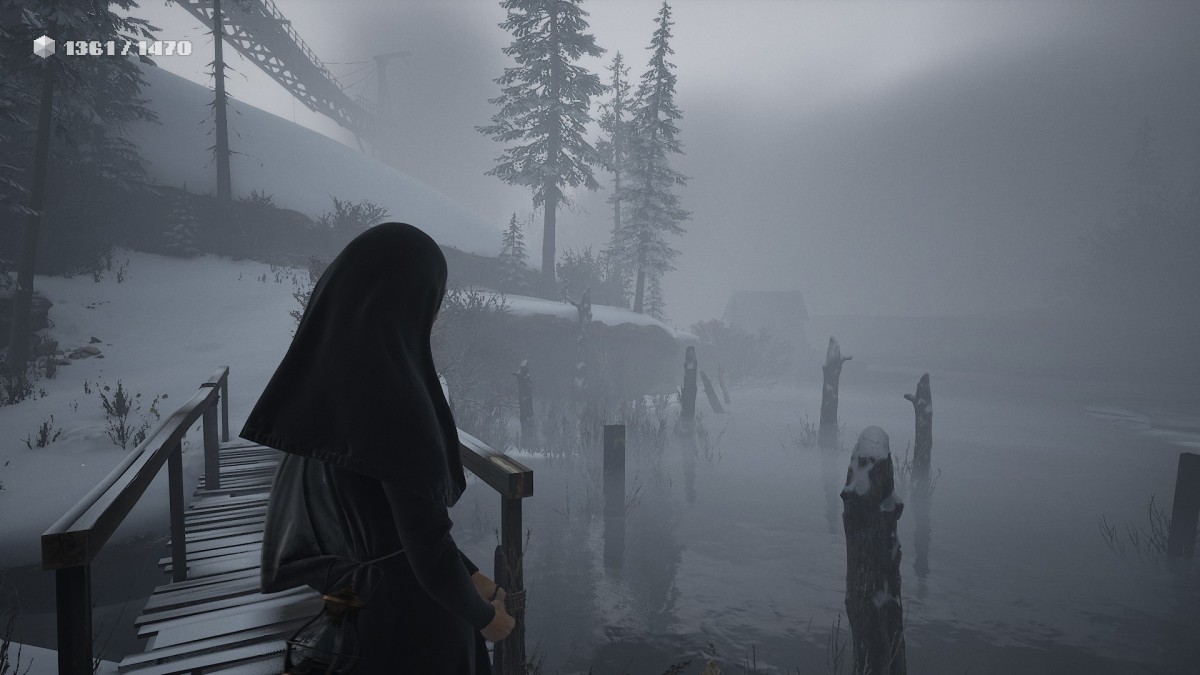Indika is a captivating indie game from a team once based in Russia, a team that swiftly left their home when the invasion of Ukraine began and moved to Kazakhstan. It’s the tale of a nun, the titular Indika, who talks to the Devil and of an escaped convict who converses with God. It’s a tale of a woman fighting her faith, a game of philosophical discussions about how sin is measured ( a murder is equal to a thousand undelivered letters) and musing on what a soul is and whether a dog has one. It’s a lot of things, wrapped up in a gorgeously bleak visual style, topped with a sinfully dry sense of dark humour. Most of all, it’s the kind of game I’m glad exists, because above all else, it’s interesting and different and weird, and we need those kinds of experiences. It’s also not a game for everyone, and that’s good too.
Two things are clear: the other Orthodox nuns are shunning (or should that be sh-NUN-ning) Indika for something she has done, and are attires even bullying her – hardly a very Christian attitude. The opening section has Indika completing mindless chores at the behest of her Sisters who refuse to look her in the eye or even utter a “thank you” as she trudges back and forth. It isn’t long before you realise why Indika is struggling to fit in though: she hears a voice talking to her, one that’s gleefully poking holes in beliefs. Is Indika suffering from some unknown mental malady, or is the Devil speaking to her? Unsurprisingly, she’s putting her money on it being the Devil, and honestly, he’s making some good points.
Price: $24.99/ £20.99
Release Date: 02/05/2044
Platforms: PC, PS5, Xbox Series S/X
Reviewed: PC
Developer: Odd Meter Games
Publisher: 11Bit Studios
The other obvious thing is that the game is tonally a bit weird: there are “quests” popping up in pixelated text, the background music is some weird melody that sounds like it’s out of an arcade game and there are points to collect that the game itself describes as “pointless.” You can level up to unlock nodes like +3 shame that promise to multiply future points. Most of these are earned for gathering collectibles or performing a couple of menial tasks. Essentially, you’re levelling up your faithfulness by doing bullshit, kind of like we level up in games by grinding away. And yet here I am, dutifully collecting the collectables regardless.
But lo! Indika has a glimmer of hope as she is handed a letter and told to deliver it to a distant monastery. It’s a chance to escape and a daunting prospect because this game is set in an alternate version of 19th-century Russia, and things are, frankly, a bit grim. This is a miserable place where people are dirty and cold, where buildings have fallen down chasms or are perched precariously on top of ruins and look like they’ll tumble if the Jenga block at the bottom moves half an inch.
It’s a beautiful game, in a brutal, dour sort of way. The world itself is fantastical at times, a mixture of realism and surreal weirdness. One moment you’re walking through a relatively normal ramshackle group of buildings covered in snow, and the next there’s an absurdly massive dog sleeping behind a fence or cans of fish the size of a human, or a massive steam-powered crane capable of lifting humungous chunks of bridge with ease. I spent a lot of time pondering whether everything I was seeing was real in this alternate version of 19th-century Russia or perhaps some manifestation of the turmoil within Indika. At one point I even wondered if Indika had a form of psychosis, which would certainly explain some of the odder scenes in the game, like a miniature clone of a nun erupting from her mouth and dancing along her arm.
And honestly, even after finishing the game, I’m not quite sure how much was real, how much was an exaggerated version of Indika’s mental struggle and how much may be a sign that her mind is no longer entirely her own.
I love a lot of the small details here, like how Indika grasps her rosary beads and walks with her head bowed. Spinning the camera around gives a brief glimpse of her nervous, darting eyes. She’s smart, too, often boasting a surprising amount of knowledge about technology and other subjects.
It’s not long before Indika finds herself tangled up with an escaped convict by the name of Ilya, a man with an infected arm who firmly believes God has spoken to him and laid out a plan for him which will lead to him being healed. For much of the game, it’s Indika and Ilya travelling together. Confronted by a person with such conviction while she is struggling with maintaining her faith, Indika can’t help but begin to poke and prod at Ilya’s belief just like the strange voice keeps questioning hers. She finds loopholes in his logic, and inconsistences with what he says and how he acts, all while the voice in her head keeps mocking Indika, asking why she believes something or idly throws around the kind of dark thoughts that tend to soar through our own minds, however fleetingly.
To be honest, if you’re like me, an outsider to religion, Indika’s (the game, not the character) ruminations on religion- its function, its core ideas, how souls work, God, the Devil and everything in between – doesn’t really come to any startling new revelations. If you’ve ever given religion about 5-minute of thought you’ve likely had the same conversations or versions of them with yourself or with friends that Indika (the character. Christ, this is confusing) finds herself having with Ilya.

That’s fine though, because there isn’t a lot of new ground to tread when it comes to religion, and even though it’s familiar stuff the story of Indika coming to terms with whether or not she really believes in God is engrossing. The conversations are captivating and often subtly funny, supported by some really excellent voice acting. Isabella Inchbald handles the English version (with Anastasia Dyachuk performing the native Russian) and she absolutely nails it to a cross. Indika is sweet, charming, often shy and occasionally confident. And when she talks about her faith or lack of it, she’s nervous and worried, hesitation soaked into every line spoken, like by voicing these thoughts she’s expecting to be struck down at any moment. Louis Boyer is also great as Ilya while Silas Carson plays a fantastically jovial Devil.
There are a few issues here and there with the script, mind you. Most of it seems to come down to localization. A few sentences don’t feel quite right, a couple of pauses in the conversation are a tad odd because one character starts talking like they didn’t hear the previous sentence. Perhaps that’s actually deliberate, though. Minor problems that don’t really get in the way of the otherwise riveting story of Indika.
You may have guessed from all this that Indika has a lot in common with what’s typically referred to as the “walking sim” genre of games. You’d be right. There’s an awful lot of walking and talking in |ndika, and even the developers themselves have joked about this in various interviews. But it does try to mix up the bombastic action of Indika ambling through snow while pontificating about whether anybody can genuinely love God of their own free will (maybe eat an edible, Indika?) by throwing in a puzzle or two. These are usually simple sequences where you do something like shift a box around or figure out the order in which two elevators must be moved around. Nothing too complex, but also somewhat boring to complete.

In stark contrast to the muted greys and blacks of Indika’s adulthood, the flashbacks to her childhood are colourful and vibrant, rendered as charming 2D pixel-art games that slowly reveal how she wound up as a nun. It’s a fun shift that goes hand-in-hand with the game’s dark humour and sense of oddness (there’s some proper weird shit) but the mini-games themselves are a bit hit-and-miss. And God help anyone who jumps into Indika expecting a slow experience only to find themselves having to perform some precise timed leaping over dancing frogs. A few older members of the Steam forums had this exact problem, believing it would be mostly walking and talking only to find their progress stalled by a surprising 2D platforming section.
As a game then, Indika is kind of…well, naff. If gameplay is the defining thing you look for when shopping around for a new game, then Indika is probably best left alone. This is one for those who appreciate a story above all else. It’s also a story where the author doesn’t give in to the trend of having an ambiguous ending and instead gives you an actual finale, albeit one where what happens next will probably never be answered. I was satisfied by the ending, and that’s a rare thing these days.
In multiple interviews, creative director and writer Dmitry Svetlov has described his inspiration for Indika as being a mixture of his religious upbringing and his own gradual loss of faith, as well as how religion has become a weapon Putin uses against the Russian people.

“Priests just say you should defend your country, you should die for your homeland, and you go to heaven. It’s madness,” he said to the Guardian.
In the very same interview he describes how the conversations Indika has along the way mirror the ones he had with friends when he was 15 years old, trying to make his religious friends understand his growing scepticism with the Orthodox Church.
You can feel all of this in Indika throughout the 3-4 hours it takes to complete. As Indika struggles internally with who she is, externally we see a Russia on the brink of collapse. It is, of course, an alternate history version of Russia, but even so…it’s hard not to imagine that this is the Russia Dmitry sees now.
Beautiful and captivating and thoughtful and fucking weird, Indika is the kind of odd experiment that I love to see in games. It’s a reminder that games can be a lot of things to a lot of very different people. Indika is not for everyone and that’s good because there are a hundred other games out there that will be. But if Indika’s themes of religion and philosophy and free will and sin and whether good or evil mean anything in a world where God and the Devil are real speak to you, then Indika is a hell of a journey to go on. I can’t wait to see what developer Odd Meter creates next.



